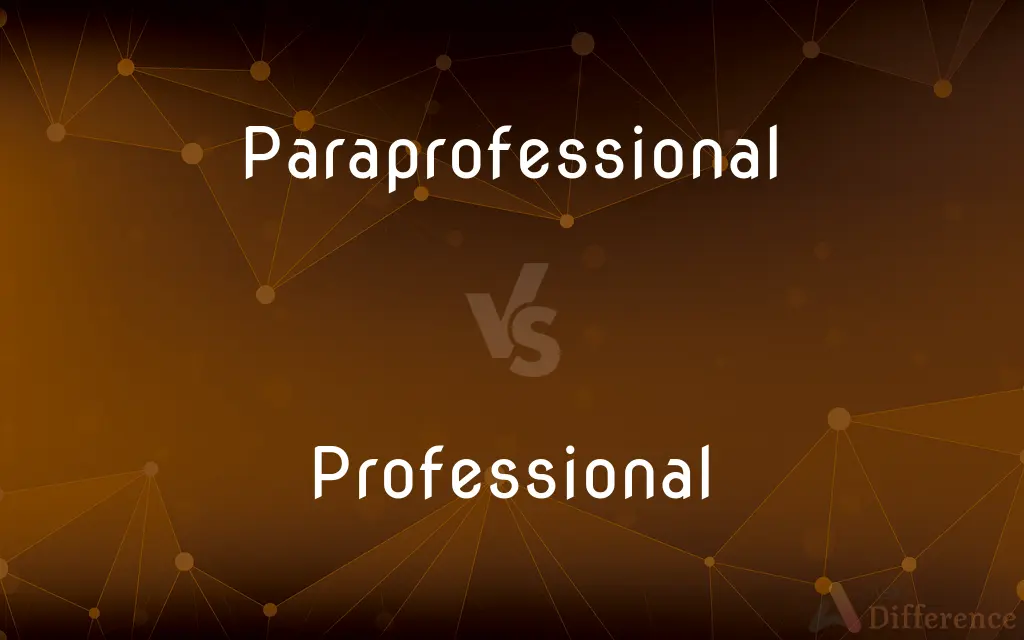Paraprofessional vs. Professional — What's the Difference?
By Urooj Arif & Fiza Rafique — Updated on March 18, 2024
Paraprofessionals provide support in various fields under the guidance of professionals, whereas professionals possess specialized knowledge and autonomy in their practice.

Difference Between Paraprofessional and Professional
Table of Contents
ADVERTISEMENT
Key Differences
Paraprofessionals, often referred to as paraeducators or teacher's aides in educational settings, work alongside licensed professionals, providing essential support services but not holding the same level of certification or autonomy. Professionals, on the other hand, have completed advanced education and training, obtaining certifications or licenses that grant them the authority to practice independently in their fields, such as doctors, lawyers, and engineers.
In education, paraprofessionals may assist in classroom management, student support, and administrative tasks, under the supervision of certified teachers, while professionals, such as teachers, develop curriculum, deliver instruction, and are responsible for educational outcomes.
In healthcare, paraprofessionals like nursing assistants support patient care activities, while professionals like registered nurses and doctors make clinical decisions and provide comprehensive care.
Paraprofessionals often enter their roles with on-the-job training or specific certifications that do not require extensive education, making their roles crucial yet distinctly supportive, whereas professionals typically undergo rigorous education, training, and licensure, ensuring a high level of expertise and decision-making capability in their practice.
The collaboration between paraprofessionals and professionals enhances the efficiency and effectiveness of services across various sectors, with paraprofessionals extending the reach and impact of professional work through their support roles.
ADVERTISEMENT
Comparison Chart
Education and Training
Often requires specific training or certification, but less than a professional
Requires advanced education, training, and often licensure
Autonomy
Works under the supervision of professionals
Has the authority to practice independently
Roles
Provides support services and assists professionals
Performs tasks requiring specialized knowledge and makes independent decisions
Examples
Teacher's aides, nursing assistants
Teachers, doctors, lawyers
Decision-making
Limited decision-making authority, focused on support tasks
Significant decision-making authority in their field of expertise
Compare with Definitions
Paraprofessional
Paraprofessionals provide support to professionals, enhancing service delivery.
Paraprofessionals in schools assist with classroom management and student support.
Professional
Professionals often require licenses or certifications.
Certified public accountants (CPAs) must pass a licensing exam to practice.
Paraprofessional
Their work is typically supervised by fully qualified professionals.
Dental assistants work under the supervision of dentists, providing patient care support.
Professional
They have the autonomy to make decisions and practice independently.
Physicians diagnose and treat patients based on their medical expertise.
Paraprofessional
They often have targeted training relevant to their support roles.
A paralegal, as a paraprofessional, undergoes specific legal training to assist lawyers.
Professional
Professionals possess advanced expertise in their fields.
Engineers apply scientific principles to design and build structures and systems.
Paraprofessional
Paraprofessional roles can be entry points into a profession, requiring less initial education.
Many educational paraprofessionals pursue teaching certifications while working.
Professional
Their roles typically require extensive education and training.
Lawyers must complete law school and pass the bar exam to practice law.
Paraprofessional
They perform crucial tasks that complement the work of professionals.
Nursing assistants, vital paraprofessionals in healthcare, support patient care activities.
Professional
Professionals have significant authority in their field, guiding outcomes and practices.
Architects have the authority to make design and construction decisions on projects.
Paraprofessional
Paraprofessional is a title given to individuals in various occupational fields, such as education, healthcare, engineering, and law. Historically, paraprofessionals assisted the master professional of their field.
Professional
A professional is a member of a profession or any person who earns a living from a specified professional activity. The term also describes the standards of education and training that prepare members of the profession with the particular knowledge and skills necessary to perform their specific role within that profession.
Paraprofessional
A trained worker who is not a member of a given profession but assists a professional.
Professional
Of, relating to, engaged in, or suitable for a profession
Lawyers, doctors, and other professional people.
Paraprofessional
Of or performing the work of a paraprofessional.
Professional
Conforming to the standards of a profession
Professional behavior.
Paraprofessional
A person who is trained to assist a professional.
Professional
Engaging in a given activity as a source of livelihood or as a career
A professional writer.
Paraprofessional
Of or relating to this assistance.
Professional
Performed by persons receiving pay
Professional football.
Paraprofessional
A trained worker who is not a member of a profession but who assists a professional
Professional
Having or showing great skill; expert
A professional repair job.
Professional
A person following a profession, especially a learned profession.
Professional
One who earns a living in a given or implied occupation
Hired a professional to decorate the house.
Professional
A skilled practitioner; an expert.
Professional
A person who belongs to a profession
Professional
A person who earns their living from a specified activity
Professional
A prostitute
Professional
A reputation known by name
Professional
An expert
Professional
Of, pertaining to, or in accordance with the (usually high) standards of a profession.
Professional
That is carried out for money, especially as a livelihood.
Professional
(by extension) Expert.
Professional
Of or pertaining to a profession, or calling; conforming to the rules or standards of a profession; following a profession; as, professional knowledge; professional conduct.
Professional
Engaged in by professionals; as, a professional race; - opposed to amateur.
Professional
A person who prosecutes anything professionally, or for a livelihood, and not in the character of an amateur; a professional worker.
Professional
A person engaged in one of the learned professions
Professional
An athlete who plays for pay
Professional
An authority qualified to teach apprentices
Professional
Engaged in a profession or engaging in as a profession or means of livelihood;
The professional man or woman possesses distinctive qualifications
Began her professional career after the Olympics
Professional theater
Professional football
A professional cook
Professional actors and athletes
Professional
Of or relating to or suitable as a profession;
Professional organizations
A professional field such as law
Professional
Characteristic of or befitting a profession or one engaged in a profession;
Professional conduct
Professional ethics
A thoroughly professional performance
Professional
Of or relating to a profession;
We need professional advice
Professional training
Professional equipment for his new office
Professional
Engaged in by members of a profession;
Professional occupations include medicine and the law and teaching
Common Curiosities
Do paraprofessionals and professionals work together?
Absolutely, their collaboration is often essential for efficient and effective service delivery, with paraprofessionals providing support that allows professionals to focus on complex tasks.
Do all professional roles require a college degree?
Most professional roles require advanced education, often a college degree or higher, along with specific training and licensure, depending on the field.
Can a paraprofessional become a professional?
Yes, many paraprofessionals pursue further education and training to meet the qualifications required to become professionals in their field.
Is the role of a paraprofessional less important than that of a professional?
No, paraprofessionals play crucial roles that support and enhance the work of professionals, contributing significantly to the overall success of services and projects.
What impact do paraprofessionals have on the accessibility of services?
Paraprofessionals can significantly increase the accessibility and affordability of services by handling tasks that do not require the advanced expertise of a professional.
How does the supervision of paraprofessionals work?
Professionals supervise paraprofessionals by providing guidance, setting task parameters, and ensuring that their work meets the required standards.
How does one become a professional?
Becoming a professional typically requires completing advanced education, obtaining relevant certifications or licenses, and gaining experience in the field.
What is the key difference in decision-making between paraprofessionals and professionals?
Professionals have the autonomy to make significant decisions in their field of expertise, while paraprofessionals' decision-making is generally more limited and supervised.
Is there a clear line between paraprofessional and professional roles?
While there are clear distinctions in terms of education, licensure, and decision-making authority, the specific tasks and responsibilities can sometimes overlap, depending on the workplace.
Are paraprofessionals only found in education and healthcare?
No, paraprofessional roles exist in various fields, including law (paralegals), technology (IT support technicians), and more, providing support across a wide range of professional services.
What are the benefits of being a paraprofessional?
Paraprofessional roles offer valuable experience, the opportunity to impact service delivery, and a pathway to professional careers for those who wish to advance.
What trends are affecting the roles of paraprofessionals and professionals today?
Technological advancements, changes in regulatory standards, and evolving service delivery models are shaping the roles and collaboration dynamics between paraprofessionals and professionals.
How do paraprofessionals contribute to a professional's work?
They handle many support tasks and responsibilities, allowing professionals to focus on more complex aspects of their work, thus enhancing efficiency and effectiveness.
Can paraprofessionals work independently?
While paraprofessionals can perform many tasks independently, their work is generally under the oversight and within the scope defined by professionals.
How does the pay scale differ between paraprofessionals and professionals?
Professionals typically earn higher salaries due to their advanced education, expertise, and decision-making responsibilities, while paraprofessionals' pay reflects their supportive role and required level of training.
Share Your Discovery

Previous Comparison
Guarantor vs. Obligor
Next Comparison
Longsuffering vs. PatienceAuthor Spotlight
Written by
Urooj ArifUrooj is a skilled content writer at Ask Difference, known for her exceptional ability to simplify complex topics into engaging and informative content. With a passion for research and a flair for clear, concise writing, she consistently delivers articles that resonate with our diverse audience.
Co-written by
Fiza RafiqueFiza Rafique is a skilled content writer at AskDifference.com, where she meticulously refines and enhances written pieces. Drawing from her vast editorial expertise, Fiza ensures clarity, accuracy, and precision in every article. Passionate about language, she continually seeks to elevate the quality of content for readers worldwide.
















































